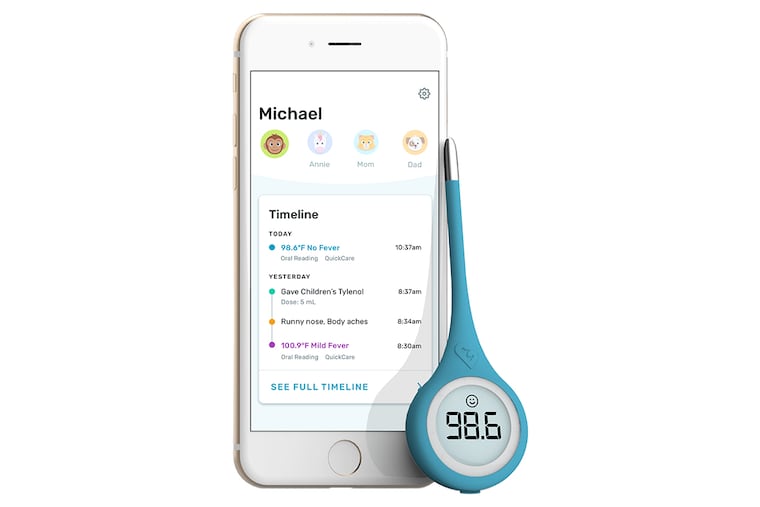Smart thermometers could help track COVID-19 surge in Philadelphia — if used in a smart way
Philadelphia health officials are trying all sorts of pandemic management tools.

In late summer, Philadelphia health clinics gave out 5,000 internet-enabled thermometers, free, to low-income families in the hope that tracking unexpected upward blips in fevers could be used as an early warning of COVID-19 outbreaks.
Kinsa Health launched the smart thermometer network eight years ago to monitor seasonal flu. Now, with a trove of historical data and more than two million homes across the country in the network, the San Francisco-based company says the fever data are proving helpful for real-time detection of coronavirus spread.
Just one hiccup for the Philadelphia Department of Public Health: Most residents who took the thermometers didn’t download the mobile phone app that automatically sends data to Kinsa whenever a temperature is taken. They’re using the high-tech oral thermometers as ordinary thermometers.
“A lot of the initial batch weren’t activated to contribute fever data,” said Hannah Lawman, chief of operations for the city health department’s division of COVID-19 containment. “Only 10% were activated. Maybe they don’t realize that’s part of the usefulness."
The health clinics don’t have a list of thermometer recipients to contact them, Lawman added. (Kinsa promises all users confidentiality and privacy.) But now that the clinics are giving away another batch of 5,000, health workers are stressing the importance of downloading the app.
“We’re searching for as many pandemic tools as possible, including water testing, hospital census, antigen testing, PCR testing, contact tracing,” said health department spokesperson James Garrow. The thermometer network “is not a tool that will help us discern transmission, but it’s still a tangential indicator.”
Through school programs and retail sales, Kinsa already had thousands of thermometers in Philadelphia before the pandemic hit, said spokesperson Nita Nehru. The city health department has used federal pandemic aid to buy thermometers that could be targeted to poorer zip codes, where COVID-19 has taken a disproportionate toll. The city paid a discounted price of $20 per device.
“The thermometer is $25 retail,” Lawman said. “So we don’t expect low-income families to purchase them.”
Kinsa, founded by philanthropist Inder Singh, got regulatory approval of its thermometer in 2014. Since then, it has accurately predicted the spread of seasonal flu about two weeks before the Centers for Disease Control and Prevention, which has a national surveillance program that relies on information sent in by doctors' offices.
Kinsa has gotten quite a bit of good publicity, including a New York Times article at the beginning of the pandemic that prompted Philadelphia health officials to inquire about the smart thermometer network.
The company’s daily data for Philadelphia, graphed on a chart, clearly show the impact of the pandemic and efforts to curb it. Compared with the expected percentage of residents with fevers from flulike illnesses, Philadelphia had a sharply higher percentage from March until early June, when mask mandates and shutdowns curbed COVID-19. Now, a month into the second wave of the pandemic, the observed level of fevers is again above expectations.
There are limitations to the data, as New York Times technology specialist Charlie Warzel wrote in an opinion piece in June. The information is not much help at detecting how much COVID-19 is in a community, or how long it stays.
“It’s a warning siren, not a detailed accounting of what has happened,” Warzel wrote.
As record-setting numbers of new COVID-19 cases are reported here and across the country, warning sirens have been blaring for weeks. That’s why Philadelphia is again imposing tough restrictions, including shutting down indoor dining, gyms, sports arenas, and museums. New Jersey also has announced new limits on gatherings.
“Because COVID-19 cases are at an all-time high, we must buckle down and take action to slow the spread,” Pennsylvania Gov. Tom Wolf tweeted Sunday, although he has not announced renewed controls — yet.